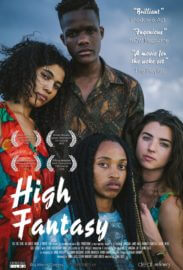
https://www.filmplatform.net/product/high-fantasy
A group of young friends on a camping trip, deep in the South African countryside wake up to discover they’ve all swapped bodies. Stranded in the wilderness, they’ll have to navigate a personal-political labyrinth if their friendship and their lives are ever to be the same again.

I like to think of my films as follows: “Strange things happening to people
you know”. The people in my films should feel real because they are: Not
only are they familiar, but they’re fully realised, breathing characters, ready
to step of the screen at any moment. I see one of the greatest strengths of
cinema as it’s ability to place a viewer right into another’s shoes – no
matter how comfortable or uncomfortable – right into another’s otherwise
inaccessible life experience. With High Fantasy, the message and the
medium perfectly synchronise.
This story allows an audience of young South Africans a cathartic, headon
collision with the layered identity politics so relevant to the born-free
generation of our country, and abroad. It’s a story for those who are
questioning their freedom and the very narrative on which they were
raised. Issues around race, gender and class have made us even more
painfully aware that the societies we live in value some of our bodies more
than others. White bodies formed an untouchable human shield during
Cape Town’s Fees Must Fall protests around free, equal education in
South Africa, while black bodies were water-cannoned and rounded up
into police vans. Such images calcified the reality of our country: A place
where the past haunts us still, like a curse, something it seems it will take a
miracle – or at least a supernatural intervention – to escape from.
Key in-amongst this is the idea of empathy, our ability to understand each
other, an issue much in debate, especially when it comes to generational
pain. What would it really take for us to live happily together in mutual
understanding? To fully understand each other’s pain? Do we need to
literally swap places? And what would the result of this utopian miracle
actually be? What can we, as humans living together, really do with this
hard-earned empathy? Does it help us change our behaviour? Or does it only heighten our discomfort, our feelings of guilt, anger and despair? The
body swap premise of High Fantasy also helps us confront – in the most
direct way – sensitive issues around ownership of land, property and even
people. When roles are reversed, what right do we have to what we
previously owned? And tied to that, how much ownership can we ever
expect; over material possessions, what we’ve inherited, or even what
we’ve come to believe in? It also helps us look, through a fantastical lens, at
serious matters of gender and rape, the assumed powerlessness or
commodification of women’s bodies, as well as the liberation that is slowly
but surely happening as gender and sexuality barriers are broken down.